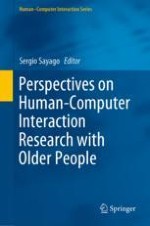2019 | OriginalPaper | Buchkapitel
15. Working Towards Fostering Programming Acceptance in the Everyday Lives of Older and Adult People with Low Levels of Formal Education: A Qualitative Case Study
verfasst von : Sergio Sayago, Angel Bergantiños, Paula Forbes
Erschienen in: Perspectives on Human-Computer Interaction Research with Older People
Aktivieren Sie unsere intelligente Suche, um passende Fachinhalte oder Patente zu finden.
Wählen Sie Textabschnitte aus um mit Künstlicher Intelligenz passenden Patente zu finden. powered by
Markieren Sie Textabschnitte, um KI-gestützt weitere passende Inhalte zu finden. powered by
